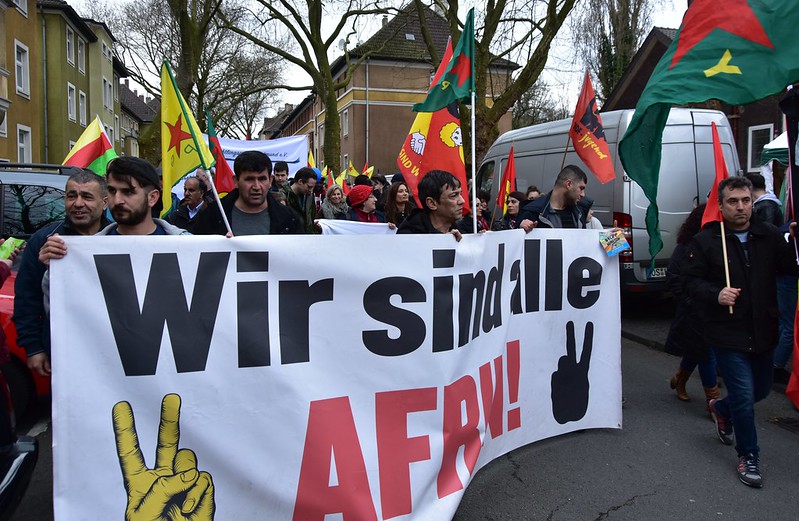Two years ago, Turkey launched an unprovoked invasion of the northwestern Syrian Kurdish enclave of Afrin. Since then, primarily through its Syrian militia proxies, it has instigated a concerted campaign to upend the region’s long-established Kurdish-majority demographics as well as eradicate its cultural heritage.
Turkey launched its perversely named Olive Branch operation in January 2018 under the pretext that the Syrian Kurdish People’s Protection Units (YPG), and affiliated all-female Women’s Protection Units (YPJ), posed a direct threat to its security and territorial integrity. While both groups were essentially founded as the Syrian branch of the Kurdistan Workers’ Party (PKK), which Turkey has fought in its Kurdish-majority southeast and Iraqi Kurdistan for decades, neither the YPG/J in Afrin nor northeast Syria’s Kurdish-majority regions ever used their territories as a launchpad to attack Turkey.
Aside from dubious claims that its intervention was aimed solely against combating terrorism, Turkey and its proxies targeted civilian areas causing a massive displacement of well over 100,000 civilians in the Kurdish-majority enclave – in other words over half of the indigenous population. The Turkish military’s indiscriminate shelling of villages also created terror and certainly contributed to the mass displacement of local Kurds.
“I have never see[n] shelling like that, the bombs were pouring on us like rain,” was how one survivor described the shelling to Amnesty International.
Amnesty also noted that “use of artillery and other imprecise explosive weapons in civilian areas is prohibited by international humanitarian law.” Turkey’s Syrian mercenaries also infamously mutilated the body of a YPJ fighter named Barin Kobani.
Turkey also oversaw the wanton destruction of Afrin’s cultural heritage sites. Most notably, the ancient Ain Dara archaeological site, a Neo-Hittite temple built by the Arameans over 3,000 years ago, was severely damaged by Turkish airstrikes despite having no discernible military value to the YPG/J. When Turkey’s militia proxies entered Afrin city in March 2018, one of the first things they did, aside from loot civilian homes and businesses in broad daylight, was tear down the statue of Kawa, a blacksmith in Kurdish tradition that is a central figure in the Kurds’ celebration of the Nowruz new year, in the city centre as Turkish troops watched on. The destruction of such cultural symbols was eerily reminiscent of the destruction of other heritage sites in Iraq and Syria at the hands of the notorious Islamic State.
Under Kurdish self-governance since 2012, Afrin stood out as a multi-denominational enclave in Syria where minorities felt safe. Indeed, the tiny region also took in and sheltered several Syrian Arabs displaced from elsewhere in the country. The Yazidi community, and even a community of Kurdish converts to the Evangelical Protestant Church of the Good Shepherd, in the region were also able to express and celebrate their religious identity freely. That all changed with Olive Branch. Yazidis now in camps adjacent to Turkish-occupied Afrin lamented the fact they can probably never return home and expressed fears that “their identity is being erased in the villages left behind.” The investigative journalism site Bellingcat examined several incidents in which Turkey’s proxies in Afrin purposely desecrated or outright destroyed various symbols of Yazidi culture in Afrin.
Another policy Turkey oversaw sought to cement the demographic changes caused by Olive Branch. Turkey hurriedly resettled displaced Syrian Arabs from the Syrian regime’s violent seizure of East Ghouta in vacated Kurdish homes, occupying forces even issued residency permits. Such effort toward ‘Arabization’, however, is not supported by all the otherwise desperate and destitution Syrian Arab internally displaced persons. For example, a 29-year-old Arab from Khalid al-Hassan arrived with his family shortly after the Turkish invasion upon fleeing a ferocious military bombardment himself. According to the news site Syria Direct, he was immediately offered an empty Kurdish home for his family for free but selflessly refused to let himself “become a passive participant in someone else’s displacement so soon after experiencing it himself.”
“We are displaced from our homes, and are coming as guests to this region,” he said. “We are not accepting these houses for free without the permission of their owners.”
Today, the displaced Kurds from Afrin are presently enduring a freezing winter with little more than tents for shelter and warmth. The Turkish-backed occupation of their region, and the various abuses against civilians that come with it, will likely persist for the foreseeable future. Even if these Kurds, Yezidis and others, can someday return to their homeland, Turkey’s aggression has already ensured it will never be the same again.
Image credit: Zuse24

